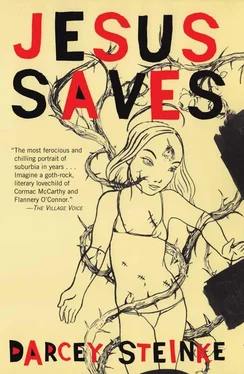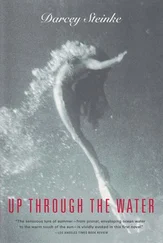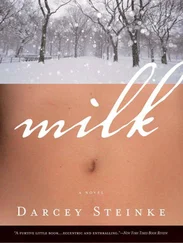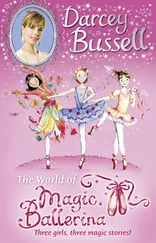“How's business?” Steve asked.
The hippie sat back and sighed. His lips were delicate and wet, exotic as a pink orchid against the coarse strands of his rust-colored beard. “It's getting scary.” He pulled his braid over his shoulder. “The guy I usually buy from, the one with the hydroponics complex out on Route Seven, got tipped off that the Feds were onto him. He closed down and split to Vancouver. There was another operation out of Florida, run by a young kid, a Dead head,” he rolled his eyes, “but I hate the risk of driving up the interstate, makes my ass sweat just thinking about it. These days,” he shook his head, “nobody cares about the spirit, man, nobody wants to transcend. It's not just drugs folks are down on, but the whole spirit world. Hell, you can't even talk about God without people catching each other's eyes and thinking you're crazy. The fundamentalists have turned Jesus into a redneck. It's pathetic. I think we should let the Indians take over the government; it's the only way to satisfy the earth. People think you can just build a mall or a highway, but the earth is not into that — you have to respect the earth, and if you don't the earth gets hungry and wants blood. That's what plane crashes are all about, blood payment. People think revolution is about intentional violence, but it can be so organic. No different than when those underground plates shift in an earthquake — it's like a new community forms beneath the old and then suddenly whoa,” the hippie shook the table so Ginger had to put a hand down to secure her beer, “tremors start coming up, getting bigger and bigger, knocking down skyscrapers and highway ramps. Ginsberg man, he had it right, he said the first rule in any revolution is to keep a lot of vodka in the freezer. I seen him smoke joints rolled with twenty-dollar bills. One time we wanted Dylan to play at our rally and Allen, man, he says, Dylan might play, but only if war is never mentioned, only if the protesters all carry signs with pictures of different kinds of vegetables. But the best was Che; he was a God to us. Once we all went down to South America to see him. He comes in wearing his green army pants and his black felt beret, and he starts talking about the revolution in Cuba, the guns they got stored, and his plans for his people, and I was thinking, oh man, to be a real revolutionary with uniforms and guns, and then it's like Che read my mind, because he gets this real serious look on his face and he says, I envy you. You are fighting in the belly of the beast. ”
The girl moaned and the hippie paused, glanced into the living room, and said, “Looks like that loony chick is waking up.” He looked at Ginger. “Go in there and sit with her. I don't want her freaking out again.”
Ginger pushed back her chair and walked into the living room, sat on the arm of the couch. Bunches of dried roses hung from the ceiling and the room reeked of pot smoke and gingery Middle Eastern perfumes. In its clutter, the place reminded Ginger of her own house, the same ambiguity to the world of things. On the TV was a washed-out African plain, then close-ups of zebras turning their heads in quick gestures of fear.
The girl yawned and moved her hands over her head, stretched, so her ribs pressed through her skin and the tiny bones in her neck cracked. It was a gesture so private in its animal intensity that Ginger felt embarrassed. The girl opened her eyes to slits, tried to focus first on Ginger, then the darkened window over the TV.
“What time is it?” she asked.
“Around eleven,” Ginger said.
The girl nodded sleepily, looked at the TV. A herd of gazelles ran across the screen. “What's your name?”
“Ginger.”
“I knew a girl once named Pepper. There were three sisters and they were all named after spices.” The girl sat up and pulled her sweatshirt down.
Ted came into the room. “We're going in a minute.” He sat on the other arm of the couch. “What's on?”
“Some nature show,” Ginger said.
The girl stared at Ted. “What happened to your face?” she asked him.
“It got blown off in Nam,” he said.
The girl looked at Ginger and then at Ted.
“You look young for your age,” she said.
“Yeah,” Ted said, “I'm kind of magical that way.”
“Don't tease her,” Ginger said.
“It's okay,” the girl smiled. “I know he's only joking.”
The hippie asked Ted to take the girl home and so she sat now in the backseat, legs folded under her and the army blanket pulled over her shoulders. She had a baby doll's voice and knew all the words to every song on the radio.
“Don't you wish,” the girl said, “that you could move things around with your mind, so you could get a Coke from the fridge by just thinking about it. Wouldn't that be cool?” She tapped Ginger's arm like a child wanting a response from its mother and said again, “Don't you think that would be cool?”
Ginger turned her head and smiled and the girl took this as affirmation and leaned up over the front seat. “You know,” she said, “last night I had a dream that a witch flew out my bedroom window with my doll, and my mother had to call the army to get it back.”
Steve gave a condescending snort and Ted glanced at her with a look that said Stop encouraging that girl. But Ginger liked her, knew she was talking so much because she was lonely, that she needed some attention.
“I don't feel so good,” the girl said suddenly. She was offended by Ted's and Steve's patronizing silence and slumped back heavily against the seat to pout.
Ginger turned around, “Are you going to be sick?”
The girl shook her head, tightened her lips, and leaned her cheek against the window. She was trying to be brave, the way little girls do when they've scraped their knee or have a splinter, when a bumblebee's wiggled into their frilly anklet and stuck its stinger into the pink flesh of their soles.
“So where are we going?” Steve asked. At first he couldn't keep his eyes off the girl's tiny breasts, but her talking had ruined all that and now he just wanted her out of the car.
“I live in Woodbridge Hills,” the girl said, “right up there.” She clung to the door handle, her breath making little clouded circles that she wiped away with her sleeve.
Ted made a left turn off the road into a pre-fab subdivision hugging the highway. The entrance was marked with a well-lit bill-board surrounded by white gravel. Streets were named after the contractor's daughters: Ashley Court, Jennifer Street, and Laura Lane.
A lot of women were abandoned here, left to raise teenagers in exhausted-looking split-levels. Mothers who were at work, or at the club, or so tired in the evening they didn't care what happened. Some slept all weekend with their doors locked; some went out to the Hilton Bar and drank margaritas. Inside these houses, the TV was always on and kids jumped on the beds until the slats broke and had wrestling competitions in the basement. Walls were smudged with food and toothpaste and she'd even seen muddy tennis-shoe tracks on the ceiling, as if divorce had made the children light as feathers.
“Go slow,” the girl said, as they passed a blue ranch house. Inside its bay window, a table lamp underlit ceramic comedy and tragedy masks mounted over the couch. “That one,” the girl said, pointing to a white split-level, with burgundy shutters and a colonial eagle hung over the door. “That's it,” the girl said, “that's Sandy's house.”
The silver Tot Finder sticker drew Ginger's eye to the second-floor window, and deep inside the room a votive candle burned on a white dresser. Next to the dresser was the painted door Ginger’ d seen in the newspaper; the white unicorn, the rainbow, the fluffy clouds, all painted in a sweet amateurish style by Sand y herself.
Читать дальше
